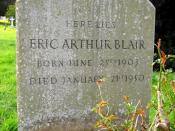Critical Analysis of "Shooting an Elephant"
In George Orwell's essay "Shooting an Elephant," the author's character develops from the pressure to make a decision and the horrifying results which follow. A potential existed for Orwell to display confidence and high morals, but this potential was destroyed when he pulled the trigger. The death of the elephant signifies the weakness of Orwell's character.
Orwell is ashamed to had submitted to the pressure of the Burmans, but he does so at his own will. In the essay, his largest fear is that of public humiliation or "looking like a fool" (Orwell 206). Orwell's dilemma involves poor morals colliding with common sense. The statement "The crowd would laugh at me" (Orwell 204), is shortly followed with the point "It seemed to me that it would be murder to shoot him" (Orwell 204). These statements contradict eachother and add to the climatic decision to pull the trigger.
Respect among the people is highly valued to Orwell. He claims that "every white man's life in the East, was one long struggle not to be laughed at" (Orwell 204). This weakness plagues the author throughout the story and displays the softness of his character. This softness foreshadows the collapse of his morals, and ultimately the slow, sad death of the elephant. The authors mistake in his desision cost him the goodness of his character, and forced upon him the horrifying experience of watching the elephant die slowly in pain. This sight was so disturbing to Orwell that he leaves. "In the end I could not stand it any longer and went away" (Orwell 206). This quote also hints at the shamefullness that the author feels and the dishonor which prevails over him in the end.
Orwell does not learn from his mistake.



Good essay but...
Even though i don't like pointing out grammatical errors, should of, could of would of is in fact should have, would have, could have, didn't have etc.... Good essay though...
1 out of 2 people found this comment useful.